Russia
Bielorussia, ennesima elezione contestata.
23 Sep 2012 Intimidazioni, arresti di oppositori, litigi geopolitici. Ad ogni elezione in Bielorussia va in scena sempre lo stesso canovaccio. Non fanno eccezione le legislative di quest’anno.
Da martedì 18 settembre hanno già usufruito del voto anticipato ben il 20% degli aventi diritto. Secondo varie denunce le urne con le schede al loro interno rimarrebbero senza controllo e qualsiasi tipo di broglio sarebbe possibile. 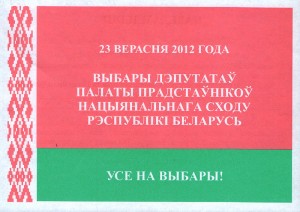
Sono oltre trecento i candidati che si contendono i 110 seggi parlamentari. Dovranno vincere con la maggioranza assoluta nella propria circoscrizione e sperare che l’affluenza alle urne sia superiore del 50% degli aventi diritto. Altrimenti sarà necessario un secondo turno.
I candidati vicini al presidente Lukashenko sono destinati a far man bassa di mandati parlamentari. Le opposizioni hanno infatti ritirato i propri rappresentanti a pochi giorni dal voto. “Queste sono state la peggiore campagna elettorale e le peggiori legislative di sempre”, la loro giustificazione.
Dal 1996 Unione europea, Stati Uniti ed Osce non riconoscono la validità delle elezioni bielorusse, minate da palesi violazioni e lontanissime dagli standard internazionali.
Questa volta una missione dell’Osce, l’Organizzazione per la sicurezza e la cooperazione in Europa, è stata invitata a presenziare alle legislative. Ma a due suoi osservatori (un tedesco ed un lituano) non è stato inspiegabilmente concesso il visto di ingresso.
Ad inizio settimana alcuni giornalisti stranieri, che avevano partecipato ad un incontro organizzato dalle opposizioni, sono finiti dietro alle sbarre. Ad un australiano della SBS è stata sequestrata l’intera attrezzatura all’aeroporto di Minsk.
Da anni Lukashenko ed alcuni alti funzionari bielorussi non possono mettere piede in Unione europea e negli Stati Uniti, dove sono stati dichiarati “persone non benvenute”.
Rispetto ad un paio di anni fa la situazione economica è migliorata anche se l’economia bielorussa rimane sull’orlo dell’abisso. Finora Minsk si è salvata soltanto grazie all’aiuto finanziario di Mosca, che teme di trovarsi alle frontiere un governo pro-occidentale. In cambio di questo sostegno la Russia si è comprata gli oleodotti e i gasdotti in transito sul territorio bielorusso verso l’Europa.
Bykivnia, the Ukrainian Katyn.
21 Sep 2012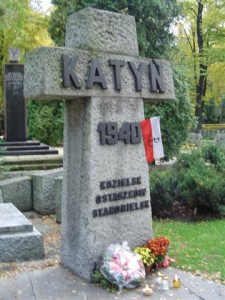
copyright EuropaRussia
“We had to wait a long time for this moment, fervently believing that it must come to pass. It is difficult to find words that express how we Poles feel” Polish President Bronislaw Komorowski said during the ceremony.
The wooded site at Bykivnia is understood to be the final resting place of 3,435 Polish citizens murdered in 1940 on Stalin’s orders by the Soviet secret police (NKVD).
The executions were part of the broader Katyn Crime in which over 22,000 Poles – largely reserve officers – were killed in mass executions at various points across the Soviet Union, including the Katyn Forest near Smolensk.
The final resting place of the Poles on the so-called “Ukrainian Katyn List” had long remained a mystery. In 2007, Polish archaeologists working at Bykivnia discovered the dog tags of Sergeant Jozef Naglik, as well as a comb with the names of four Poles inscribed on it.
The names tallied with the so-called Ukrainian List, which makes up about 15 percent of the Poles executed during the Katyn Crime. Identifying individual victims has proved largely impossible.
According to researched data, the mass burials in Bykivnia are the largest ones in Ukraine. Preliminary estimates indicate that during 1937-1941 more than 100,000 Ukrainians were also destroyed and secretly buried here.
Ukrainian President Vikor Yanukovich called the opening of the Polish war cemetery a “a moment of Solidarity between the two nations.”
Sources: Polish Radio, Memorial Kiev
Exhibitaly: Italian excellence in Moscow.
12 Sep 2012 Made in Italy takes centre stage in Moscow for four months in an exhibition at Moscow’s former chocolate factory and urban icon ”Krasni Oktiabr”, whose façade will be permanently lit with a 3-colour rendition of the Italian flag.
The Patriarshi most, the footbridge across the Moskova opposite the factory, will be transformed from 12 September to 28 October into an open-air “grand tour of Italy”, with ten transparent cases displaying Italian-made icons, which will include dresses by Valentino, Salvatore Ferragamo and Ermenegildo Zegna, a Ferrari, a Vespa, an Aprilia and two giant Arcimboldo sculptures in celebration of pasta and wine.
The initiative is entitled ”Exhibitaly – Italian excellence today” and was presented in Moscow (and simultaneously at Palazzo Chigi in Rome) at the Headquarters of the Itar-Tass agency by Italian Ambassador Antonio Zanardi Landi. “We intend by this event to further enhance our image”, he explained, citing a rise of 33% in Italian exports to Russia 2011 (according to the more realistic Russian statistics that keep track of the origin of imports), along with increased Russian tourism in Italy (visas issued are up 40%).
The Government has earmarked €4.5 million for the promotion of Made in Italy in Russia – “an important sign at a moment when we are seeking to unite rigor with growth”, the ambassador commented in the margins of the event. The opening is planned for 12 September, with “The energy show”, two exhibitions curated by ENEL, to be followed by home design (11-28 October), fashion design (7-27 November) and innovation (5 December ’12 – 6 January ’13). A broad series of side events are also planned involving the works of famous Italian Renaissance and major contemporary artists.
source: Italian Foreign Ministry
APEC CEO Summit 2012 Program. Vladivostok.
6 Sep 2012Day 1 Friday, September 7
| 09:00 – 09:15 | Welcome and opening ceremony | ||||
Conducted by Andrey Kostin, APEC CEO Summit Chairman
09:15 – 10:30Panel discussion:
Economic integration: benefits and unintended consequences
Moderator: Tian Wei, Anchor, CCTV
Discussion participants:
The Right Honourable John Key MP, Prime Minister of New Zealand
Igor Shuvalov, First Deputy Prime Minister of the Russian Federation
Dennis Nally, Chairman, PwC International
John Faraci, Chairman and CEO, International Paper
10:30 – 11:00Coffee break
11:00 – 12:00Panel discussion:
How many currencies does the world need?
Moderator: David Pilling, Asia Editor, Financial Times
Discussion participants:
Clifford Bennett, Chief Economist, White Crane Group
Andrey Kostin, Chairman of the Management Board, VTB Bank, APEC CEO Summit Chairman
Jing Ulrich, Managing Director and Chairman of Global Markets – China, JPMorgan Chase
12:00 – 13:00Panel discussion:
Resources: what are the limits to growth?
Moderator: Dominic Barton, Managing Director, McKinsey & Company
Discussion participants:
Michael Klare, Director of the Five College Program in Peace and World Security Studies (PAWSS)
Igor Sechin, President, Rosneft (TBC)
Peter Voser, CEO, Royal Dutch Shell plc
13:00 – 14:00Networking lunch
14:00 – 15:00Interactive sessions convened concurrently
Panel discussion:
Water: new global strategic resource
Moderator: Fedor Lukyanov, Editor-in-Chief of the Russia in Global Affairs magazine
Discussion participants:
His Excellency Truong Tan Sang, President of the Socialist Republic of Viet Nam
His Excellency Sebastián Piñera, President of Chile
Umran Beba, Region President, Asia Pacific, PepsiCo
Chew Men Leong, Chief Executive, Singapore’s national water agency, PUB
Session: Food: feeding seven billion people
Moderator: Vyacheslav Nikonov, President, Polity Foundation, Deputy of the State Duma of the Federal Assembly of the Russian Federation
Discussion participants:
Samuel Allen, Chairman of the Board, John Deere & Co.
Craig Emerson, Minister for Trade and Competitiveness of Australia
Ning Gaoning, Chairman of COFCO
Kazuhito Yamashita, Research director of the Canon Institute for Global Studies
15:00 – 15:15Break
15:15 – 16:15Interactive sessions convened concurrently
Panel discussion:
Supply chains: ever more efficient, ever more vulnerable?
Moderator: Donald Almeida, Vice Chairman Clients and Markets, PwC
Discussion participants:
Igor Levitin, Adviser to the President of the Russian Federation
Ziyavudin Magomedov, Chairman of the Board of Summa Group
Scott Price, President and CEO, Walmart Asia
16:15 – 16:30Break
16:30 – 17:30Panel discussion:
Infrastructure for sustainable growth
Moderator: Aleksandr Gabuev, Deputy Editor-in-Chief of Kommersant Vlast’ Weekly
Discussion participants:
Oleg Budargin, Chairman, FGC UES
Pat Dawson, Asia Pacific President, The Dow Chemical Company
Oleg Deripaska, President, En+ Group, CEO, UC RUSAL
Vladimir Dmitriev, CEO VEB
Yang Bong Jin, CEO, Hyundai Energy and Resources Ltd.
17:30 – 18:00Coffee break
18:00 – 19:00Plenary session:
Address of His Excellency Mr. Vladimir Putin,
President of the Russian Federation
19:00 – 20:00Transfer to the Party venue
20:00 – 23:30CEO Summit Party
21:30 – 23:30Transfer to the Russky Island
22:00 – 23:30Nightcap conversation:
Russia in APEC: towards equal partnership
Moderator: Evelina Zakamskaya, Anchor, Russia-24 TV-Channel
Special guests:
Andrey Kostin, Chairman of the Management Board, VTB Bank, APEC CEO Summit Chairman
Ziyavudin Magomedov, Chairman of the Board of Summa Group
Jim Rogers, international investor, author of “A Gift to My Children”
Igor Shuvalov, First Deputy Prime Minister of the Russian Federation
James Turley, Chairman and CEO, Ernst & Young Global
Day 2 Saturday, September 8
| 08:00 – 08:45 | Interactive morning sessions convened concurrently |
Panel discussion:
Emerging multinationals: joining the club
Moderator: Gordon Orr, Chairman, Asia, McKinsey & Company
Discussion participants:
| His Excellency Lien Chan, Leader’s Representative of Chinese Taipei |
Rado Antolovic, CEO, Novorossiysk Commercial Sea Port
John Quelch, Dean, Vice President and Distinguished Professor of International Management, the China Europe International Business School (CEIBS, Shanghai)
Session: Technologies: the next big thing
Moderator: Vijay Vaitheeswaran, China‘s Business Editor, The Economist
Discussion participants:
Saeed Amidi, Сo-founder & CEO of Plug and Play Tech Center
Anatoly Chubais, CEO and Chairman of the Executive Board, Rosnano
Artyom Kudryavtsev, President, TransTeleCom
John Oyler, Founder and CEO of BeiGene (Biotech)
8:45 – 09:00Break
09:00 – 09:30Address of His Excellency Mr. Hu Jintao, President of the People’s Republic of China
09:30 – 10:00Coffee break
10:00 – 11:00Interactive sessions convened concurrently
Panel discussion:
Making cities fit for business, their people and the planet
Moderator: Bill Hutchison, Executive Director, Center for Smart Cities Innovation, Ernst & Young
Discussion participants:
Leung Chun-ying, Chief Executive, Hong Kong Special Administrative Region
Sergey Sobyanin, Mayor of Moscow
Oleg Govorun, Minister of Regional Development of the Russian Federation
Session: Education today, success tomorrow
Moderator: Tatyana Malkina, journalist, editor-in-chief of the Journal of Russian Ideas
Discussion participants:
The Hon Julia Gillard, Prime Minister of Australia
Dmitry Livanov, Minister of Education and Science of the Russian Federation
Sir Michael Barber, Chief Education Adviser, Pearson
Sergey Ivanets, Rector of the Far Eastern Federal University
Andreas Schleicher, Special Advisor on Education Policy, OECD PISA
11:00 – 11:15Break
11:15 – 11:45APEC Leader interaction:
His Excellency Mr. Felipe Calderon, President of Mexico From Los Cabos to Vladivostok: G20’s Impact on Global Economy Growth
11:45 – 12:00Break
12:00 – 12:30APEC leader interaction:
The Honorable Hillary Rodham Clinton, Secretary of State of the United States of America(TBC)
| 12:30 – 13:00 | Coffee break | ||
| 13:00 – 13:30 | Address of His Excellency Susilo Bambang Yudhoyono, President of Indonesia | ||
| 13:30 – 14:30 | Networking lunch | ||
| 14:30 – 15:30 | Interactive sessions convened concurrently Panel discussion:Emerging markets middle class: the new consumer Moderator: Kaori Enjoji, Tokyo Bureau Chief, CNBC Asia Pacific Discussion participants: Rupert Keeley, Senior Vice President, PayPal Europe and Asia Pacific Bernd Schmitt, Executive Director, Institute on Asian Consumer Insight Wang Hongzhang, Chairman, China Construction Bank |
||
| Session: Women in charge means fewer man-made disastersModerator: Marina Kim, Presenter, Russia TV channelDiscussion participants:Robert Hormats, Under Secretary of State of the United States of America for Economic Growth, Energy, and the EnvironmentHu Shuli, Editor-in-Chief, Caixin Media
Olga Sloutsker, President of Russian Fitness Group Artem Volynets, CEO, En+ Group |
Conf. room 2 | ||
| 15:30 – 16:00 | Coffee break | ||
| 16:00 – 17:00 | Interactive sessions convened concurrently Debate:Has capitalism lost its compass? Moderator: Peter Lavelle, Host, RT Special guests: David Daokui Li, Professor at the Tsinghua University School of Economics and Management Jim Rogers, international investor, author of “A Gift to My Children” Chandran Nair, Founder of the Global Institute For Tomorrow (GIFT) Hernando de Soto, President of the Institute for Liberty and Democracy (ILD) |
Conf. hall | |
| Session:Health is wealth Moderator: Diane Brady, Senior Editor, Bloomberg Businessweek Discussion participants:Ian McCrae, CEO, Orion Health
Craig Mundie, Chief Research and Strategy Officer, Microsoft Dominic Caruso, CFO, Johnson & Johnson Gita Wirjawan, Indonesia Trade Minister |
Conf. room 1 | ||
| 17:00 – 17:15 | Break | ||
| 17:15 – 17:30 | Closing ceremony | ||
«Китай — новая мировая держава, Россия — ностальгическая страна с нелегким будущим. Уже два десятилетия бывшие партнеры по коммунистической идеологии имеют различную судьбу. И предстоящий саммит АТЭС похож на триумфальную церемонию для второй по величине экономики мира. Особенно из-за уже объявленного отсутствия во Владивостоке президента США Барака Обамы. 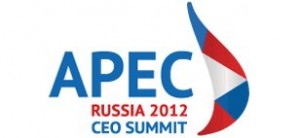
Если бы в 1989 году, когда милиция стреляла по демонстрантам на площади Тяньаньмэнь, а международное общество с интересом и надеждой взирало на советскую перестройку, какой-нибудь специалист спрогнозировал нынешний сценарий, его бы наверняка упрятали в желтый дом.
Что же произошло в Поднебесной? Случилось чудо? Нет…
Долгие годы в России я слышал, что, мол, «мы, как китайцы, должны были следовать политике мелких шагов, а вместо этого перешли к рыночной экономике методом шоковой терапии». Такие вещи у нас в Италии называют «городскими легендами», которые не имеют ничего общего с реальностью…. »
Статья Джузеппе Д’Амато Московский Комсомолец № 26032 от 4 сентября 2012 г. Giuseppe D’Amato Moskovskij Komsomolets.
APEC 2012, Basic Information.
4 Sep 2012APEC was founded as an informal consultative forum to promote economic cooperation, encompassing, as members, the leading economies in the region. When APEC admitted three new members during the third APEC Ministerial Meeting in Seoul in November 1991, the protocol was accepted to refer to the three new member economies as the People’s Republic of China; Hong Kong, China; and Chinese Taipei. As such, APEC’s members are always referred to as “Economies” rather than countries or nations. The use or display of national flags, symbols or anthems is prohibited and only simple nameplates of the member economies are displayed at any APEC function.
Today APEC includes 21 Asia-Pacific economies. APEC member economies are Australia, Brunei, Canada, Chile, China, Hong Kong China, Indonesia, Japan, Korea, Malaysia, Mexico, New Zealand, Papua New Guinea, Peru, the Philippines, Russia, Singapore, Chinese Taipei, Thailand, the United States, and Vietnam.
Members account for 54.9% of the world’s gross domestic product, 47.1% of the world’s goods and services trade, 44.5% of the world’s total accumulated direct investments, and 39.9% of the world’s population.
APEC–2012 declared priorities:
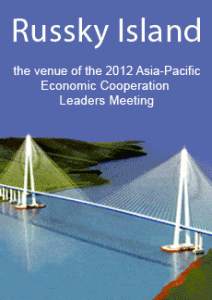
APEC – Russky Island from apec2012.ru
trade and investment liberalization, regional economic integration, strengthening food security, establishing reliable supply chains,intensive cooperation to foster innovative growth.
Russia proposes discussing the long-term prospects of regional and global integration, sustainable growth and new challenges to trade and investment liberalization, elimination of trade and investment barriers for small and medium-sized enterprises, and establishment of reliable supply chains.
The two days of the CEO Summit (Sept. 7th– 8th) will be devoted to an exchange of ideas between business and government leaders on the advantages and adverse effects of economic integration, the prospects for global and regional currencies, infrastructure development for economic growth, and the future of capitalism in general. Other sessions will include focus on the development of cities in a rapidly changing world, the emergence and role of transnational corporations, and the growth of the middle class in emerging markets.
In 2007 Russky Island was chosen as the site for the Asia-Pacific Economic Cooperation Leaders’ Week (APEC). Large-scale construction was launched on the island.
Russky Island is located in the Peter the Great Gulf and is part of Vladivostok’s Frunzensky district. The island is sometimes called the Far East’s Kronstadt. The Eastern Bosphorus Strait separates it from the Muravyov-Amursky Peninsula where Vladivostok, the capital of Russia’s Primorye Territory, lies.
Pussy Riot. Позор, какой позор!
21 Aug 2012 «Россия, без сомнения, уникальная страна. Какая другая держава могла подарить миру такой шедевр, как Pussy Riot? Большие блестящие глаза, мягкие ресницы и беззащитная улыбка непонимания на скамье подсудимых. На них гневно лают и прокурор, и судья, и православные блогеры; против них весь госаппарат путинского самодержавия, правосудие которого международная общественность сейчас сравнивает с мракобесной инквизицией средних веков. Однако, не надо обижать средние века… 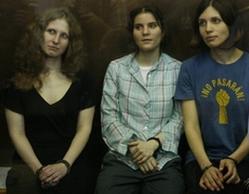
Мадонна в шоке, Горбачев, Стинг и немецкий Бундестаг. Запад солидарен. На улицах Москвы, Праги, Парижа, Дублина собираются девушки в пестрых балаклавах и нелепых платьях московских панк-паночек, чтобы орать: “Free Pussy!”, “Свободу Pussy Riot!”. Бесспорно, они сейчас получают более широкую поддержку на Западе, чем когда-то все советские диссиденты вместе взятые. И – извините, но уж так получилось – они сейчас самая известная музыкальная группа России за рубежом. А раскрутили их патриарх Кирилл, его пиар-советники да Хамовнический Суд.
Российские власти вряд ли смогли бы придумать нечто более эффектное, чтобы показать всему цивилизованному миру: мы не правовое государство, мы империя зла и глупости, мы никогда не будем с вами… »
Статья Штефан Шолль – Московский Комсомолец № 26019 от 20 августа 2012 г., Stefan Scholl Moskovskij Komsomolets.
Pussy Riot, le istituzioni cadute nella loro trappola. La biografia scabrosa di Nadezhda Tolokonnikova.
20 Aug 2012 Quando sono entrate nella Cattedrale di Cristo il Salvatore le Pussy Riot erano delle perfette sconosciute, oggi sono famose in tutto il mondo.
Formatosi nell’agosto 2011, il gruppo punk-rock femminista ha scelto la strada della provocazione e dello scandalo per imporsi. In pratica, la stessa strategia pubblicitaria seguita dalle colleghe ucraine protettrici dei diritti delle donne, “Femen”, che si mostrano nude ad ogni occasione pubblica utile. L’uso sapiente di Internet ha poi fatto il resto.
Adesso, dopo sei mesi di reclusione preventiva, le massime star musicali mondiali si sono mobilitate per la loro liberazione, fior di impresari se le contendono tenendo pronti assegni pieni di zero e giovinastre impertinenti imitano il loro canto anti-potere in giro per l’Europa.
Proprio giovedì 16 il marchio “Pussy Riot” è stato ufficialmente registrato. In Russia diventerà uno dei simboli della protesta anti-Cremlino soprattutto a partire dall’autunno che si attende assai caldo, mentre all’estero sarà un “brand” dell’anti-potere, degli anti-globalisti, sostengono gli esperti.
Le tre ragazze hanno insomma vinto alla lotteria ed, appena fuori di galera, potranno godersi una montagna di soldi. Le offerte di lavoro non mancano, nonostante, a giudicare dai video, non sappiano poi cantare e ballare così bene (hanno un repertorio assai limitato) e non siano delle bellezze di prima grandezza.
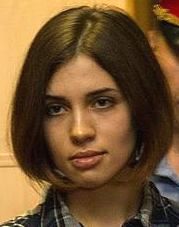
La più disinibita delle tre, la ventiduenne Nadezhda Tolokonnikova, ha appena ricevuto l’invito a posare senza veli per l’edizione ucraina di “Playboy”. In passato la ragazza, appena diciottenne, era entrata nelle cronache scabrose della capitale russa per aver partecipato in un museo ad una mega-orgia.
L’evento, denominato “Fotti l’orso”, era stato organizzato da un gruppo art “Vojna”, di cui faceva parte il marito, Piotr Verzilov. L’obiettivo era quello di protestare contro il passaggio di poteri al Cremlino tra Putin e Medvedev (cognome che assomiglia alla parola “orso”).
Nadezhda, studentessa di filosofia, era in cinta di nove mesi e quattro giorni dopo l’orgia aveva dato alla luce la figlia Geru. Le foto, in cui era impegnata in esibizioni erotiche, avevano provocato discussioni a non finire.
Nel 2010 la ventenne ha partecipato ad altre azioni clamorose, come quella di lanciare degli scarafaggi all’interno di un edificio dove ha sede un tribunale di Mosca o di disegnare un enorme fallo su un ponte a San Pietroburgo. Per l’ultima eroica azione Nadezhda ha ricevuto il premio “Innovazione”.
Chi la conosce la descrive come una provocatrice professionista, abilissima nel far cadere gli avversari nei suoi tranelli, una persona che sa esattamente quello che fa. Il Cremlino e la Chiesa ortodossa sono finiti nella sua trappola, trasformando con questo processo-scandalo delle sconosciute in eroine.
Pussy Riot condannate per teppismo religioso.
19 Aug 2012 “Vergogna! Vergogna!”. La folla urla indignata all’esterno del Tribunale. “Basta con lo stato di polizia”, uno degli slogan più ripetuti. Il giudice Marina Syrova ha appena letto la prima parte della sentenza in cui si condannano le Pussy Riot per “teppismo motivato da odio religioso”. 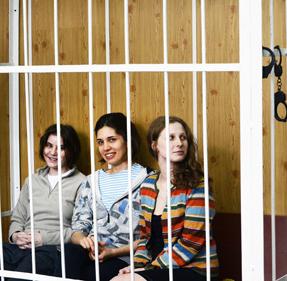
Nadezhda Tolokonnikova, Ekaterina Samutsevich e Maria Alekhina non fanno una piega. Anzi, ad un certo punto iniziano a sorridere a destra e a manca. Le tre componenti del gruppo punk-rock non si erano di certo fatte illusioni. Lo sapevano che le attendeva un soggiorno nelle patrie galere.
Rischiavano ben sette anni di carcere. Decisamente troppi! Tanto che il presidente Putin in persona era intervenuto pubblicamente nei giorni scorsi per chiedere clemenza alla corte.
Come si ricorderà il 21 febbraio, in piena campagna elettorale, le Pussy Riot sono entrate nella Cattedrale moscovita di Cristo il Salvatore – tempio principale dell’ortodossia russa – e davanti ad uno degli altari hanno inscenato una canzone-preghiera punk, registrata in video e postata su Internet, con la famosa invocazione “Vergine Maria, liberaci da Vladimir Putin”. Dopo qualche giorno sono state arrestate.
Il giudice Syrova ha spiegato che le tre imputate hanno offeso i sentimenti dei fedeli ortodossi ed hanno mostrato una “completa mancanza di rispetto”. Il loro reato è evidente: “hanno violato gravemente l’ordine pubblico”. Le testimonianze dell’accusa sono state citate e si è sottolineato che l’atto è stato “blasfemo” e non politico, poiché la famosa invocazione alla Madonna sarebbe stata inserita in un secondo momento, durante il montaggio del video, e non pronunciata nella cattedrale.
Ed in effetti le Pussy Riot, come loro stesse hanno ammesso nel corso del dibattimento processuale, ce l’avevano soprattutto con il patriarca Kirill, che aveva pubblicamente sostenuto la candidatura di Putin al Cremlino.
In queste ultime settimane sono comparse divisioni inattese nel mondo religioso. Se alcuni esponenti ufficiali ortodossi chiedevano la condanna delle tre ragazze un folto gruppo di sacerdoti ha sottolineato con dichiarazioni alla stampa che una delle funzioni pastorali è quella del perdono e non della condanna dei peccatori.
La galassia liberal-riformista anti-Cremlino ha, invece, definito il processo contro le Pussy Riot come qualcosa di simile all’“Inquisizione” spagnola per il tipo di accuse rivolte alle tre imputate.
“Come la maggior parte dei processi politici – ha commentato Ljudmila Alekseyeva, presidente del gruppo di Helsinki per i diritti umani -, questo processo non rispetta la legge, il buonsenso, la pietà”. Molto perplesso è apparso anche l’ex leader sovietico Michail Gorbaciov, secondo cui questo dibattimento si sarebbe dovuto svolgere non in un’aula di tribunale bensì in una commissione speciale.
In un messaggio fatto pervenire ai mass media attraverso i suoi avvocati Nadezhda Tolokonnikova ha affermato che “la nostra incarcerazione è il chiaro segnale che la libertà è stata scippata al nostro Paese”.
Con una Russia in preda a forti paure per il futuro e preoccupata per la recente approvazione di una serie di leggi liberticide, ci mancava proprio questo processo-scandalo, ennesimo segnale negativo della crisi psicologica e politica, in cui è sprofondata l’ex superpotenza da un anno a questa parte. Ossia da quando uno stanco Vladimir Putin ha scelto di tornare alla presidenza federale. I sondaggi danno la sua popolarità in caduta libera.
Video originale
Video successivo
Фабио Капелло и российский футбольный вызов.
24 Jul 2012«Давайте, назначайте меня главным тренером сборной команды России по футболу! Буду у вас стараться продолжать традицию легендарного итальянского журналиста Витторио Поццо, двукратного чемпиона мира — в 1934 и 1938 годах… 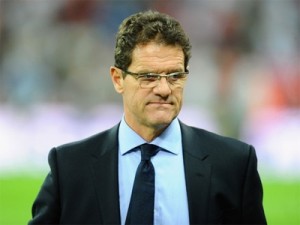
В Москве царит логика, согласно которой за деньги можно купить все. Но в определенном кругу высокооплачиваемых успешных специалистов это не так. Нужные ясные проекты, чтобы сберечь профессиональную честь.
Давайте не прятаться за пальцем: Россия никогда не была мировой футбольной державой. Кроме как в давние времена — в майках «СССР» и с большим количеством игроков из Украины и Грузии, — сборной командой ничего не выигрывала, а российские клубы стабильно плохо выступают на международной арене. И, пожалуйста, не говорите мне о великих победах в Кубке УЕФА, где ведущие европейские команды часто выпускают на поле молодых игроков (с финансовой точки зрения участие в этом турнире — просто беда!).
Россия на Евро-2012 побила все рекорды, но не те, которыми можно гордиться. Из-за своих болельщиков она стала самой оштрафованной командой турнира (потасовки, расистское поведение, использование петард) — на общую сумму более 200 тысяч евро. Плюс (то есть минус) 6 возможных штрафных очков в будущем, в случае рецидивов. А огромный баннер-флаг российских фанатов с надписью «This is Russia» получил от освещавших чемпионат журналистов неофициальный титул самого ужасного. К тому же никто не понял: почему надпись была не по-русски? ..
Что касается собственно игры, то любой новый тренер обречен идти по стопам Адвоката, то есть опираться на «базовую команду», на основе которой можно строить сборную, особенно если от него постоянно требуют побед. Но в большом футболе без четкого плана на будущее и ставки на молодых ничего не получается. Это арифметика.
После поражения от Бразилии в Японии в 2002 году Германия открыла 17 федеральных футбольных центров, Италия — всего один. А сколько Россия? Спросите у РФС. В полуфинале Евро-2012 между Германией и Италией на поле вышли пятеро немцев и четыре итальянца, которые три года назад играли друг против друга в составах национальных молодежных сборных. А какие успехи у молодых россиян? … »
Статья Джузеппе Д’Амато Московский Комсомолец № 25988 от 14 июля 2012 г. Giuseppe D’Amato Moskovskij Komsomolets.
Welcome
We are a group of long experienced European journalists and intellectuals interested in international politics and culture. We would like to exchange our opinion on new Europe and Russia.
Categories
- Breaking News (11)
- CIS (129)
- Climate (2)
- Energy&Economy (115)
- EU Eastern Dimension (85)
- Euro 2012 – Sochi 2014 – World Cup 2018, Sport (43)
- Euro-Integration (135)
- History Culture (198)
- International Policy (261)
- Military (74)
- Interviews (18)
- Italy – Italia – Suisse (47)
- Odd Enough (10)
- Poland and Baltic States (126)
- Religion (31)
- Russia (421)
- Survey (4)
- Turning points (4)
- Ukraine (176)
- Российские страницы (113)
Archives
- November 2020
- October 2020
- September 2020
- August 2020
- July 2020
- May 2020
- April 2020
- March 2020
- January 2020
- December 2019
- November 2019
- October 2019
- September 2019
- August 2019
- July 2019
- June 2019
- May 2019
- April 2019
- March 2019
- February 2019
- December 2018
- November 2018
- October 2018
- September 2018
- August 2018
- July 2018
- June 2018
- May 2018
- April 2018
- March 2018
- February 2018
- January 2018
- December 2017
- November 2017
- October 2017
- September 2017
- August 2017
- July 2017
- May 2017
- March 2017
- January 2017
- December 2016
- November 2016
- October 2016
- September 2016
- July 2016
- June 2016
- May 2016
- April 2016
- February 2016
- January 2016
- November 2015
- October 2015
- September 2015
- June 2015
- April 2015
- March 2015
- February 2015
- January 2015
- December 2014
- November 2014
- October 2014
- September 2014
- August 2014
- July 2014
- June 2014
- May 2014
- April 2014
- March 2014
- February 2014
- January 2014
- December 2013
- November 2013
- October 2013
- September 2013
- August 2013
- July 2013
- June 2013
- May 2013
- April 2013
- March 2013
- February 2013
- January 2013
- December 2012
- November 2012
- October 2012
- September 2012
- August 2012
- July 2012
- June 2012
- May 2012
- April 2012
- March 2012
- February 2012
- January 2012
- December 2011
- November 2011
- October 2011
- September 2011
- August 2011
- July 2011
- June 2011
- May 2011
- April 2011
- March 2011
- February 2011
- January 2011
- December 2010
- November 2010
- October 2010
- September 2010
- August 2010
- July 2010
- June 2010
- May 2010
- April 2010
- March 2010
- February 2010
- January 2010
- December 2009
- November 2009
- October 2009
- September 2009
- August 2009
Our books




